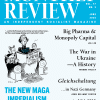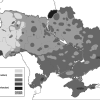
Charting a Communal-Ecological Path: Beyond the Growth Fetish
Brian M. Napoletano revisits the concept of generalized autogestion, traditionally defined broadly as “self-management,” placing it in the context of an ecological path to socialism. Using this orientation, Napoletano leads to reader to consider the potential of socioecological approaches to repairing the metabolic rift and pursuing sustainable human development. | more…

Land, Cooperation, and Socialism
João Pedro Stedile, founder and spokesperson of Brazil’s Landless Workers’ Movement (MST), reflects on the movement’s efforts to build a socialist alternative through land occupations, cooperative production, and political education. He highlights the importance of collective struggle and the MST’s deepening ties with Venezuela’s communal movement as part of a broader project to construct a just and solidarious society. | more…

Popular Power in Brazil: What Can We Learn from Indigenous, African, and Peasant Histories of Collective Resistance?
“To tell the history of resistance,” Roberta Traspadini writes, “we need to investigate the territories where people live their daily lives.” Using both historical analysis and contemporary data, Roberta Traspadini reveals the importance of Brazilian Quilombola communities as local sites of struggle against colonialism, capitalism, and imperialism. These quilombagem, she argues, reveal the revolutionary legacy that persists among the most marginalized in Brazilian society. | more…

Socioecological Contradictions in the Development of Socialist Collective Farming: Drawing from USSR and Hungarian Histories
Through a detailed exploration of the impacts of collective farming on local soils, Salvatore Engel-Di Mauro engages in key questions around the past and present of communal agricultural production. These insights shed light on not only specific projects, but future considerations for communal farming, framed by the dialectical relationship of nature and society. | more…

Making Every Yard a Farm and Every Garage a Factory: The Theory and Practice of Cooperation Jackson
Kali Akuno of Cooperation Jackson outlines the ongoing projects and objectives of the Mississippi-based collective Cooperation Jackson. Akuno enumerates the many ways Cooperation Jackson has worked toward improving material conditions and building dual power in support of the Black working and peasant classes in the Mississippi Delta region. | more…

Communal Governance and Production in Rural China Today
Sit Tsui and Lau Kin Chi elucidate the history of China’s People’s Communes as told through the lens of three present-day rural villages. In these villages, they observe the effects of the project’s dismantling and diminishing collective ownership and land management, with the conclusion that a return to collectivism is vital for carrying forward the socialist project. | more…

Inside a People’s Commune: Report from Chiliying (Excerpt)
Inside a People’s Commune is a short 1974 book documenting life in the Chiliying Commune, one of the earliest in revolutionary China. The text explores the commune’s organization, challenges, achievements, and mass-based character. Hugo Chávez later drew inspiration from the book, citing it when launching Venezuela’s communal project. Today, it continues to serve as a pedagogical tool for Venezuelan communards working to build a unified system of socialist self-government. | more…

June 2025 (Volume 77, Number 2)
This month, the editors dive into the history of Nazi Germany for a discussion of Gleichschaltung, which in this instance describes the “falling into line” of institutions and individuals under fascism. As the editors point out, the extralegal and norm-breaking actions may be justified rhetorically by the fascist regime but require the acquiescence of the larger society in order to become effective—a process we are currently watching in real time. | more…

The Trump Doctrine and the New MAGA Imperialism
In this third installment of MR‘s series on the MAGA movement, John Bellamy Foster explores the dramatic shift in U.S. imperialism that began with the first Trump presidency and has accelerated in his second. The shift, Foster explains, is not one driven by anti-imperialism and anti-militarism but rather represents a hard shift to the right fueled by hypernationalism and the goal of recapturing U.S. power on the world stage. | more…

The War in Ukraine—A History: How the U.S. Exploited Fractures in the Post-Soviet Order
Thomas Palley identifies and illuminates both the internal and external drivers of the war in Ukraine. Through this article, he explores how the breakup of the Soviet Union, the aggressive expansion of NATO, U.S. neoconservative geopolitics, present-day Ukraine’s domestic tensions, and other factors led to the current conflict, in which the only winner seems to be the United States. | more…

Big Pharma and Monopoly Capital: Four Dynamics in the Decline of Innovation
In an age of cutting-edge medical science, how do the world’s largest pharmaceutical companies stifle innovation in order to juice profits and remain competitive in the international markets? The answer, Jia Liu writes, can be found in the concept of monopoly capitalism. This brand of “intellectual monopoly capitalism,” she notes, contributes to “a logic of expropriation and rent-seeking,” leading in turn to “closed science and declining medical innovation.” | more…
What’s going on
A new poem by Marge Piercy. | more…

‘Gleichschaltung’ in Nazi Germany
In this excerpt from John Bellamy Foster’s Trump in the White House (Monthly Review Press, 2017), Foster expands on the concept, origins, and practical effects of Gleichschaltung (falling into line) in Nazi Germany and its relevance today. As Foster writes “to put such a neo-fascist strategy in place requires a new kind of Gleichschaltung“; one in which all of society—from the judiciary to Congress to cultural and media institutions—are brought into line. | more…